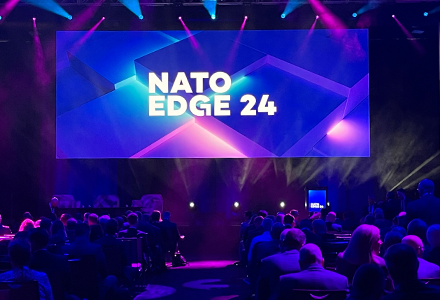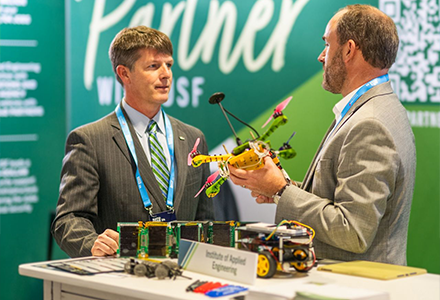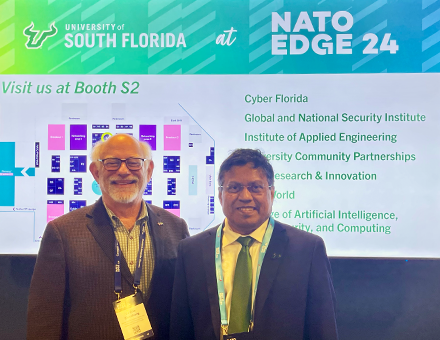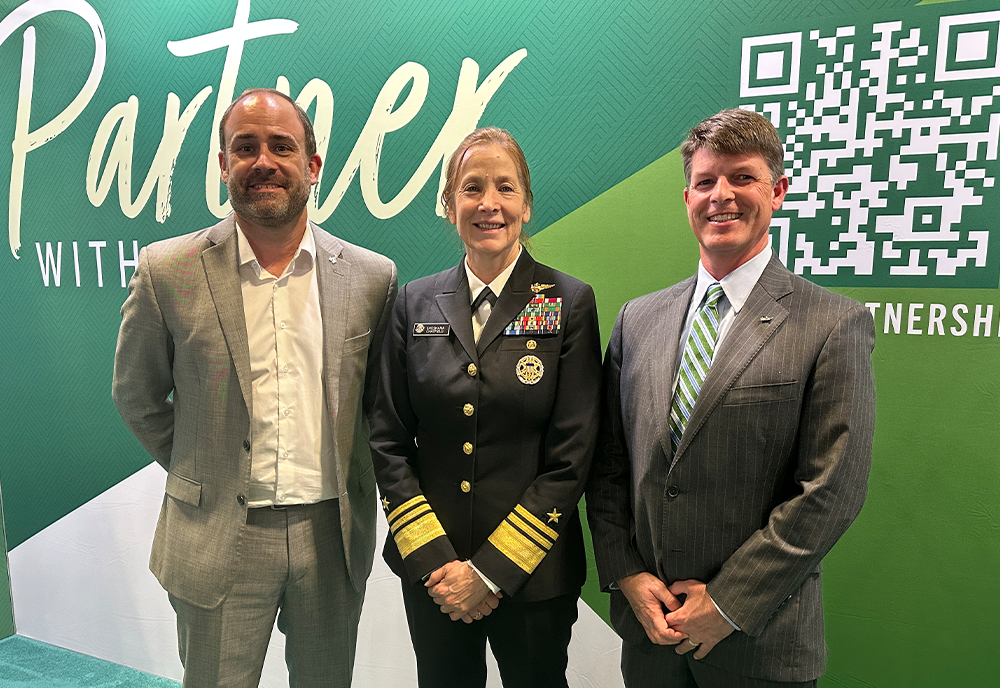
NATO Edge is held every two years to bring military commanders and directors in the alliance’s 32 member nations and partners together with industry and innovators
As global security increasingly becomes as much about technological know-how as it does military strength, the world’s most enduring alliance is looking to partnerships with industry and academic innovators to speed cutting-edge technologies to both the frontlines and cyberspace battlefields. That’s why hundreds of the world’s most advanced defense tech firms and the University of South Florida were in NATO’s sights the first week of December.
NATO’s Communications and Information Agency, the cyber arm of the 75-year-old military alliance, held NATO Edge at the Tampa Convention Center, the first time the biennial technology conference and showcase has been held in the United States. The conference drew thousands of leading defense technology experts from NATO’s 32 nations and partner countries to the city and created a rare opportunity for USF to showcase its technological and collaborative strengths. The theme for the event: “Connect, Innovate and Elevate.”

The USF Institute of Applied Engineering was founded in 2018 with the purpose of conducting research and development in technologies used national security. Among its projects is a student-led small satellite deployed by Space X. (Photo: NATO Edge)
The event put a global a spotlight on such USF entities as USF World, Cyber Florida, the Global and National Security Institute, Office of University Community Partnerships and the Institute of Applied Engineering. The Florida High Tech Corridor, which bridges university-industry research and development projects for USF, also was on hand.
Working in partnership has never been more important as nations need faster and more
nimble technology to counter threats, leaders at these two events have stressed. Gen.
Bryan Fenton, the 13th Commander of the U.S. Special Operations Command (USSOCOM)
at MacDill Air Force Base, addressed the opening session of NATO Edge, encouraging
participants from across the alliance’s 32 countries to work collaboratively to stay
ahead of security threats.
“If you are in academia today, talk to your fellow practitioners — those in uniform
or those civilians who are part of the military,“ he said. “If you are a practitioner,
talk to academia. And if you are in industry, well just talk to everybody.”

USF Senior Vice President for University-Community Partnerships Eric Eisenberg and Provost Prasant Mohapatra “pitched” industry collaborations with USF as part of NATO Edge’s program highlighting innovative efforts
USF has long had close ties to MacDill Air Force Base in Tampa, which is home of 28 mission partners, including U.S. Central Command and U.S. Special Operations Command in addition to several U.S. Air Force groups and operations. The two unified commands and other mission partners has an extended community that’s closely integrated with the NATO alliance and its more than 40 non-member countries and international organizations, called NATO partners. Additionally, U.S. Department of Defense-funded research has been a mainstay of USF’s rise as a research university, funding a wide range of projects from computer science and engineering to marine science and medical research over the decades. The USF Institute of Applied Engineering was founded in 2018 for the specific purpose of working on national security projects.
USF Provost Prasant Mohapatra and Senior Vice President Eric M. Eisenberg, who leads the Office of University Community Partnerships, “pitched” the university to attendees, noting its deep expertise in cybersecurity and the launch of a new College of Artificial Intelligence, Cybersecurity, and Computing in the spring of 2025. “To meet these challenges, we need to be creative and bold across all disciplines,” Provost Mohapatra said.
The Office of University Community Partnerships, launched this year to facilitate industry working more effectively with USF researchers and various programs, acts as a “concierge,” said USF Senior Vice President Eric Eisenberg. “We assure you that we work on your calendar, not an academic calendar,” he told the audience.
